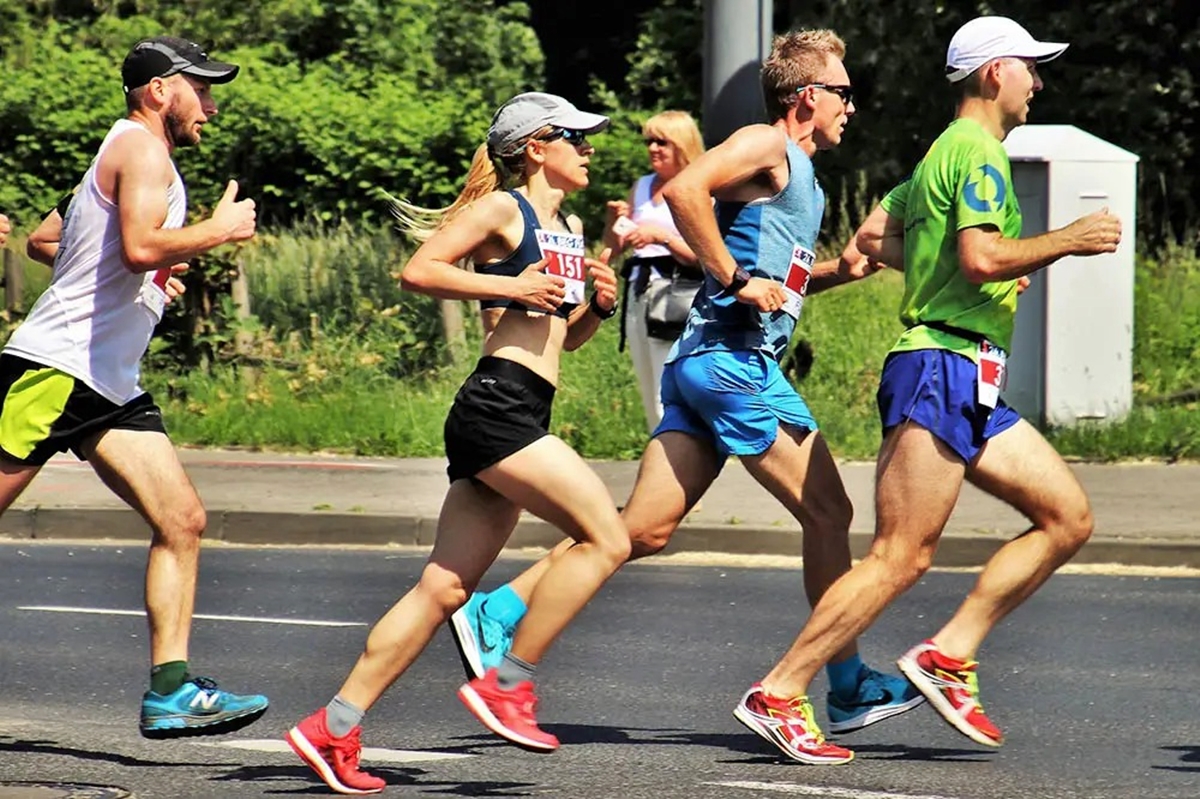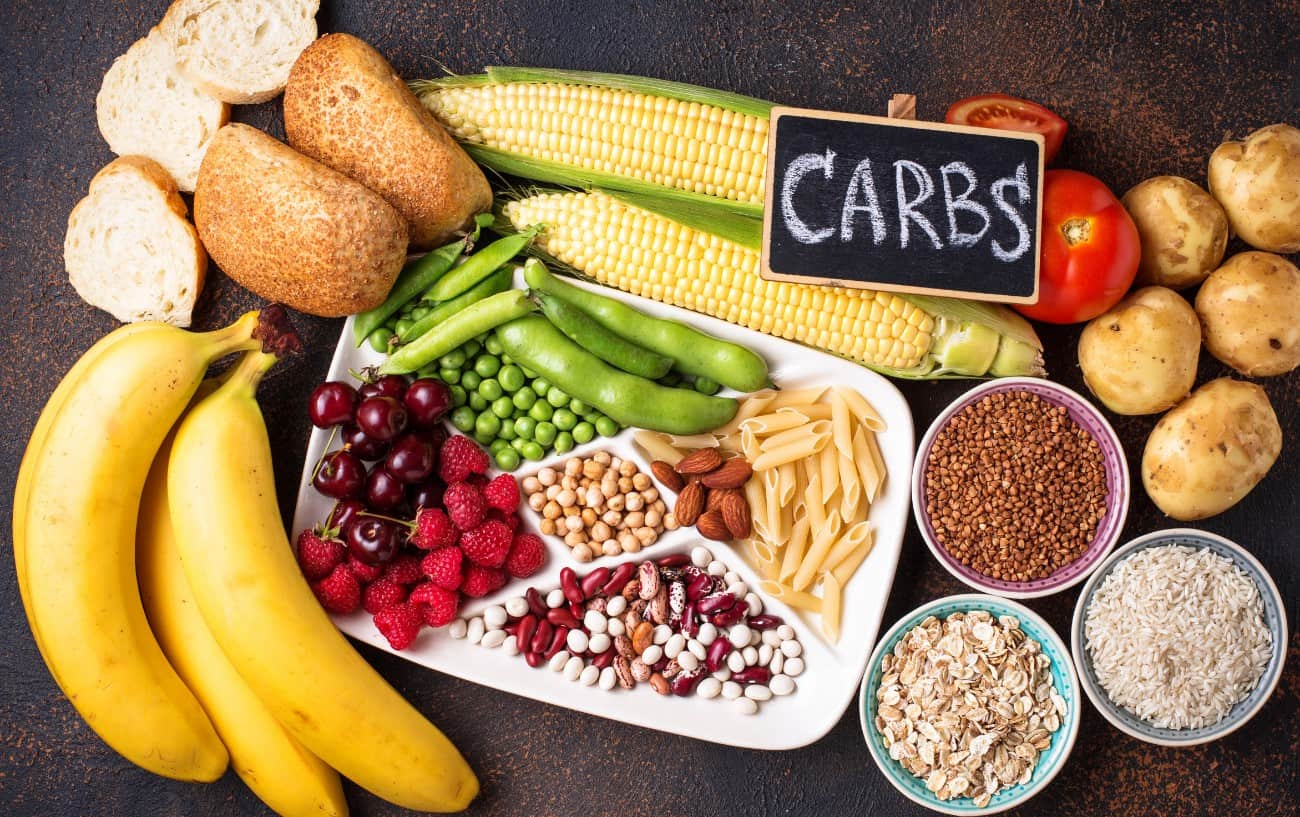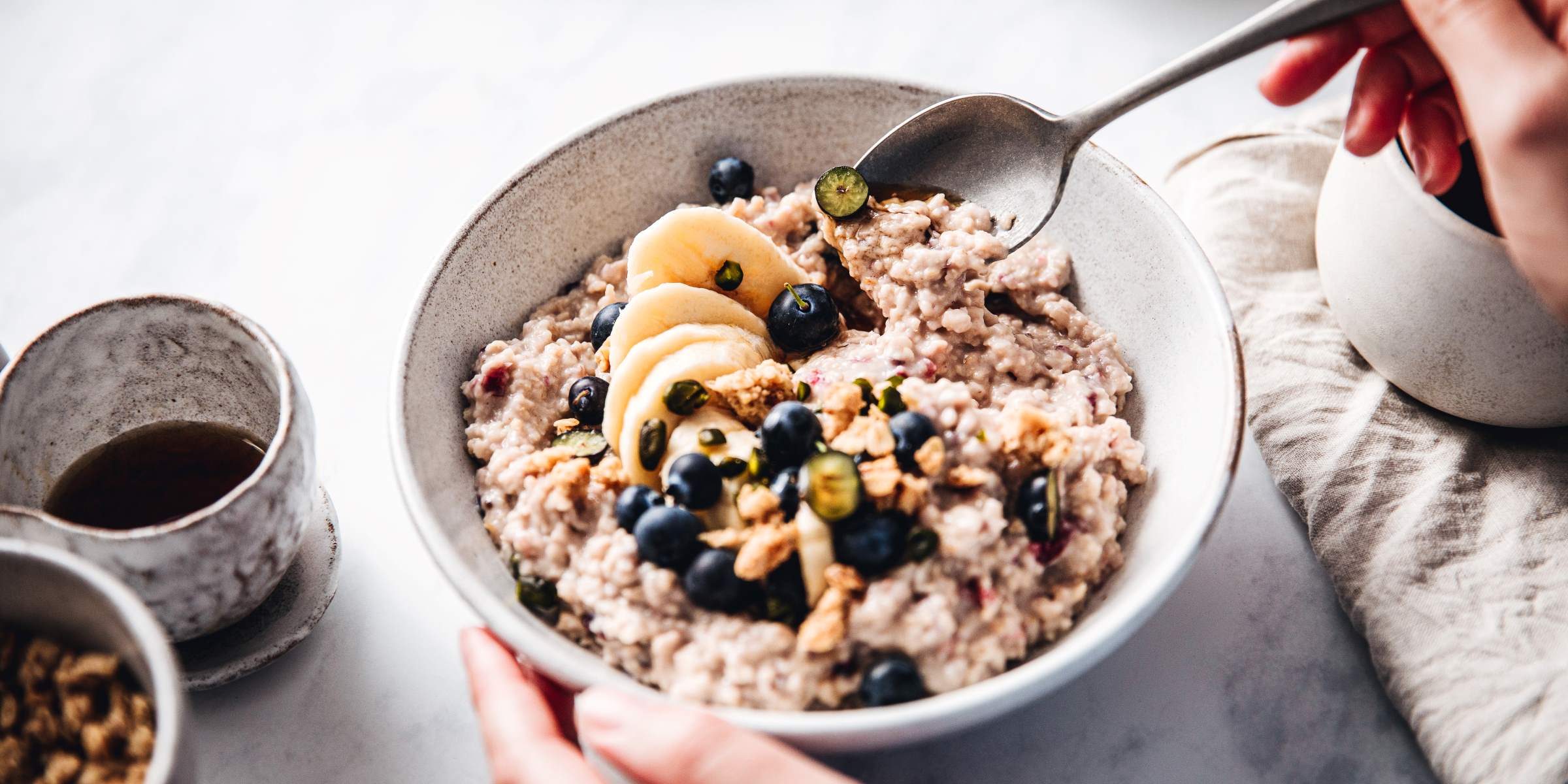

Featured
How Much Carbs After Workout
Modified: January 2, 2024
Featured: Find out how much carbs you should consume after a workout to optimize recovery and muscle growth. Discover the right balance for your fitness goals.
Introduction
Welcome to the world of fitness and post-workout nutrition! Whether you’re a dedicated athlete, a fitness enthusiast, or simply someone looking to maintain a healthy lifestyle, understanding the importance of post-workout nutrition is crucial for optimizing your results and aiding in muscle recovery.
While there are various elements that contribute to an effective post-workout nutrition plan, one key factor to consider is carbohydrates. Carbohydrates play an essential role in replenishing glycogen stores, which are depleted during exercise, and providing the energy necessary for muscle recovery and growth.
In this article, we will dive deep into the world of post-workout carbohydrates, exploring their significance in muscle recovery, determining the ideal amount to consume after a workout, and discussing the optimal sources and timing for their consumption.
Understanding the impact of carbohydrates on your post-workout routine will not only help you make informed choices about your nutrition but also maximize the benefits of your exercise regimen. So, let’s embark on this journey of discovering the power of post-workout carbohydrates together!
Understanding Post-Workout Carbohydrates
Carbohydrates are one of the three macronutrients, alongside fats and proteins, that provide the body with energy. They are essential for fueling physical activity and supporting muscle growth and repair, making them a crucial component of any post-workout nutrition plan.
When you engage in intense exercise, your body primarily relies on stored carbohydrates, known as glycogen, to meet the increased energy demands. As a result, your glycogen stores become depleted. Consuming carbohydrates after a workout helps replenish these stores, ensuring that your body has the necessary energy for recovery and preparing you for your next training session.
One reason why carbohydrates are particularly important after a workout is their impact on insulin levels. During exercise, your insulin sensitivity is heightened, meaning that your body is more efficient at taking up glucose from the bloodstream to restore glycogen stores. By consuming carbohydrates post-workout, you can take advantage of this increased insulin sensitivity and effectively replenish glycogen levels.
Moreover, carbohydrates stimulate the release of insulin, a hormone that plays a vital role in promoting protein synthesis and reducing muscle protein breakdown. This combination of carbohydrate consumption and insulin release creates an optimal environment for muscle recovery and growth.
It’s essential to note that not all carbohydrates are created equal. The quality and type of carbohydrates you choose can significantly impact your post-workout recovery. Complex carbohydrates, such as whole grains, fruits, and vegetables, are rich in fiber and provide a steady release of energy. Simple carbohydrates, on the other hand, are quickly digested and provide a faster source of energy. While both types have their place, it’s generally recommended to focus on consuming a mix of complex and simple carbohydrates to ensure a steady supply of energy post-workout.
In summary, carbohydrates play a vital role in post-workout nutrition by replenishing glycogen stores, stimulating insulin release, and supporting muscle recovery. Choosing the right type of carbohydrates is important to optimize your results and fuel your body for success.
The Role of Carbohydrates in Muscle Recovery
Carbohydrates are not only a primary source of energy for the body but also play a crucial role in muscle recovery after a workout. When you engage in physical activity, especially intense and prolonged exercise, your muscles undergo stress and microtears. Carbohydrates aid in the repair and growth of these muscles, promoting a quicker recovery and enhancing your overall fitness progress.
During exercise, your body primarily relies on glucose, which is derived from carbohydrates, as a fuel source. As you push your muscles to their limits, glycogen stores within the muscles become depleted. Glycogen is the stored form of glucose in the body, and it serves as the primary energy source during high-intensity workouts. By consuming carbohydrates after a workout, you replenish these glycogen stores, providing your muscles with the fuel they need to recover and prepare for future training sessions.
Furthermore, carbohydrates have a significant impact on protein synthesis, the process by which new muscle protein is produced. When carbohydrates are consumed along with protein, they encourage the release of insulin. Insulin, in turn, triggers the uptake of amino acids into muscle cells, promoting protein synthesis and minimizing muscle protein breakdown.
Carbohydrates also play a role in reducing exercise-induced muscle damage. Intense exercise can lead to the generation of free radicals, which are highly reactive molecules that can cause damage to cells and tissues. Consuming carbohydrates after a workout provides antioxidants, such as vitamins C and E, which help scavenge these free radicals and protect against oxidative stress, reducing muscle damage and inflammation.
Additionally, carbohydrates can have an impact on hormone levels that affect muscle recovery. Consuming carbohydrates increases levels of the hormone insulin, which not only aids in glycogen replenishment but also helps regulate cortisol, a hormone that can promote muscle protein breakdown when levels are elevated. By maintaining optimal insulin levels through carbohydrate consumption, you can mitigate the catabolic effects of cortisol and support muscle recovery processes.
In summary, carbohydrates play a vital role in muscle recovery by replenishing glycogen stores, enhancing protein synthesis, reducing muscle damage, and regulating hormone levels. Incorporating carbohydrates into your post-workout nutrition plan is essential for maximizing your gains and accelerating your fitness journey.
How Much Carbohydrates Should You Consume After a Workout?
The amount of carbohydrates you should consume after a workout depends on various factors such as the intensity and duration of your exercise, your body weight, and your specific fitness goals. While there is no one-size-fits-all answer, there are general recommendations that can guide you in determining your carbohydrate intake.
One common guideline is to aim for a carbohydrate intake of 0.5-0.7 grams per pound (1.1-1.5 grams per kilogram) of body weight post-workout. This range ensures that you’re providing your body with enough carbohydrates to replenish glycogen stores without going overboard.
For example, if you weigh 150 pounds (68 kilograms), a rough estimate would be to consume 75-105 grams of carbohydrates post-workout. However, keep in mind that these are just general recommendations, and individual variability may exist. Some athletes or individuals engaging in high-intensity or prolonged workouts may need to consume more carbohydrates to meet their energy demands.
If your goal is to build muscle or engage in intense training, you may lean towards the higher end of the recommended range. On the other hand, if your main focus is weight loss or maintenance, you may opt for a lower carbohydrate intake within the range.
It’s worth noting that post-workout carbohydrate consumption is just one piece of the puzzle. Remember to consider your total daily carbohydrate intake and distribute it throughout your meals and snacks based on your overall energy requirements and activity level.
Additionally, it’s essential to personalize your carbohydrate intake based on your body’s response. Pay attention to how you feel after consuming carbohydrates post-workout. If you find that you have ample energy and are recovering well, you’re likely in the right range. However, if you consistently feel sluggish or experience digestive discomfort, you may need to experiment with adjusting your carbohydrate intake.
Lastly, it’s important to work with a qualified healthcare professional or a registered dietitian to ensure that your carbohydrate intake aligns with your specific goals and needs. They can evaluate your individual factors and help you create a tailored nutrition plan that optimizes your post-workout recovery and supports your overall fitness objectives.
Factors to Consider When Determining Carbohydrate Intake
When determining your carbohydrate intake after a workout, several factors come into play. Understanding these factors will help you fine-tune your nutrition plan to meet your specific needs and optimize your post-workout recovery. Here are some key considerations:
- Exercise intensity and duration: The intensity and duration of your workout play a significant role in determining your carbohydrate needs. Higher-intensity exercises, such as weightlifting or high-intensity interval training (HIIT), deplete glycogen stores more rapidly and may require a higher carbohydrate intake compared to lower-intensity activities like yoga or walking.
- Body weight and composition: Your body weight and composition can influence your carbohydrate requirements. Generally, individuals with higher body weights or more muscle mass may need a higher carbohydrate intake to replenish glycogen stores adequately. However, it’s essential to consider the individual variability in carbohydrate metabolism and consult with a healthcare professional or dietitian for personalized recommendations.
- Fitness goals: Your specific fitness goals can also impact your carbohydrate intake. If your primary aim is to build muscle, you may benefit from slightly higher carbohydrate consumption to support muscle growth and recovery. Conversely, if weight loss or maintenance is your goal, carefully managing your carbohydrate intake within the recommended range can help you control calorie intake and promote fat loss.
- Timing of your next workout: If you have another workout scheduled within a few hours after your current session, it’s crucial to prioritize rapid glycogen replenishment. In this case, consuming carbohydrates with a higher glycemic index, such as simple sugars or easily digestible sources like fruit, can be beneficial. However, if your next workout is not until the following day, you have more flexibility in choosing carbohydrates with a lower glycemic index, such as whole grains.
- Individual tolerance and preferences: Everyone’s body responds differently to carbohydrate intake, and personal preferences should also be taken into account. Some individuals may feel better with a higher carbohydrate intake, while others may prefer a lower intake or have dietary restrictions that affect their carbohydrate choices. Experimentation and listening to your body’s feedback can help you find the optimal carbohydrate intake that works for you.
Considering these factors when determining your carbohydrate intake after a workout ensures that you tailor your nutrition plan to your unique needs and goals. Tracking your energy levels, performance, and recovery can help you fine-tune your approach and make necessary adjustments to optimize your post-workout nutrition.
Optimal Sources of Post-Workout Carbohydrates
When it comes to post-workout nutrition, choosing the right sources of carbohydrates is essential for replenishing glycogen stores and supporting muscle recovery. Here are some optimal sources of post-workout carbohydrates to consider:
- Whole grains: Whole grains are an excellent choice as they provide complex carbohydrates, fiber, and essential nutrients. Opt for options like whole wheat bread, quinoa, brown rice, or oats to fuel your body with sustained energy.
- Fruits: Fruits are not only delicious but also packed with vitamins, minerals, and antioxidants. They are a natural source of simple carbohydrates and provide a quick source of energy. A post-workout fruit salad or a smoothie with berries, bananas, or oranges can be a refreshing way to replenish your glycogen stores.
- Starchy vegetables: Vegetables like sweet potatoes, corn, and peas are rich in carbohydrates and provide additional nutrients and fiber. These vegetables are excellent options to include in your post-workout meals or as a side dish to complement your protein sources.
- Dairy products: Dairy products like yogurt and milk contain lactose, a naturally occurring sugar, which serves as a source of carbohydrates. They also provide protein and promote muscle recovery. Greek yogurt, in particular, is a popular choice among athletes due to its higher protein content.
- Legumes: Legumes, including lentils, chickpeas, and black beans, are not only a great source of plant-based protein but also contain carbohydrates. They offer a balance of fiber and nutrients, making them a valuable addition to your post-workout meals or snacks.
- Sports drinks or shakes: Sports drinks or shakes specifically formulated for post-workout nutrition can be a convenient option, especially for intense or prolonged exercise sessions. These beverages often contain a mix of carbohydrates, electrolytes, and sometimes protein to support glycogen replenishment and hydration.
- Timing of your next workout: If you have another workout scheduled within a few hours after your current session, it’s crucial to prioritize rapid glycogen replenishment. In this case, consuming carbohydrates with a higher glycemic index, such as simple sugars or easily digestible sources like fruit, can be beneficial. However, if your next workout is not until the following day, you have more flexibility in choosing carbohydrates with a lower glycemic index, such as whole grains.
- Individual tolerance and preferences: Everyone’s body responds differently to carbohydrate intake, and personal preferences should also be taken into account. Some individuals may feel better with a higher carbohydrate intake, while others may prefer a lower intake or have dietary restrictions that affect their carbohydrate choices. Experimentation and listening to your body’s feedback can help you find the optimal carbohydrate intake that works for you.
Considering these factors when determining your carbohydrate intake after a workout ensures that you tailor your nutrition plan to your unique needs and goals. Tracking your energy levels, performance, and recovery can help you fine-tune your approach and make necessary adjustments to optimize your post-workout nutrition.
Timing of Carbohydrate Consumption After a Workout
The timing of your carbohydrate consumption after a workout plays a crucial role in maximizing glycogen replenishment and supporting muscle recovery. Here’s what you need to know about timing your carbohydrate intake:
Immediate Post-Workout Period: The first 30 minutes to an hour after your workout, often referred to as the “anabolic window,” is a critical time to consume carbohydrates. During this time, your muscles are more receptive to nutrient uptake, and glycogen synthesis is most efficient. Consuming carbohydrates within this window helps kickstart the recovery process and replenish glycogen stores more effectively. Aim to consume a mix of both simple and complex carbohydrates to provide quick-energy and sustained fuel.
Post-Workout Meal: Following the immediate post-workout period, it’s essential to continue fueling your body with carbohydrates through a well-balanced post-workout meal. This meal should ideally be consumed within two hours after your workout. Including a combination of carbohydrates, lean proteins, and healthy fats in your post-workout meal provides the necessary nutrients for muscle recovery and helps maintain a stable blood sugar level.
Preventing Delayed Onset Muscle Soreness (DOMS): Consuming carbohydrates after a workout can also help prevent or minimize delayed onset muscle soreness (DOMS). DOMS is the muscle soreness and stiffness that occurs 24-72 hours after intense or unaccustomed exercise. Including carbohydrates in your post-workout nutrition helps reduce inflammation and muscle damage, aiding in faster recovery and potentially reducing the severity of DOMS.
Consider the Type of Workout: The timing of your carbohydrate consumption may also be influenced by the type of workout you’ve engaged in. For shorter, less intense workouts, immediate post-workout nutrition may be sufficient. However, for longer or more intense workouts, a properly timed post-workout meal becomes even more important to replenish glycogen stores and support recovery.
Individual Variability: While timing recommendations are valuable guidelines, it’s important to remember that individual variability exists. Some individuals may tolerate consuming carbohydrates immediately after a workout, while others may need a short period for digestion or have specific dietary preferences or restrictions to consider. As always, listening to your body and finding what works best for you is key.
In summary, timing your carbohydrate consumption after a workout is crucial for optimizing muscle recovery, replenishing glycogen stores, and reducing muscle soreness. Consuming a mix of carbohydrates during the immediate post-workout period and following up with a balanced post-workout meal provides your body with the fuel and nutrients it needs to repair and rebuild after exercise.
Balancing Carbohydrates with Other Nutrients
While carbohydrates play a crucial role in post-workout nutrition, it’s important to strike a balance with other nutrients to optimize recovery and support overall health. Here’s how you can achieve a well-rounded post-workout meal by balancing carbohydrates with other essential nutrients:
- Protein: Including protein in your post-workout meal is essential for muscle repair and growth. Protein provides the building blocks (amino acids) needed to rebuild and strengthen muscles. Aim to consume around 20-30 grams of high-quality protein, such as lean meats, fish, poultry, eggs, dairy products, or plant-based sources like beans and tofu, along with your carbohydrates. This combination of carbohydrates and protein helps stimulate muscle protein synthesis and aids in recovery.
- Fats: While carbohydrates and protein are primary macronutrients for post-workout nutrition, including some healthy fats is also beneficial. Healthy fats, found in avocados, nuts, seeds, and olive oil, provide sustained energy and aid in nutrient absorption. Including a small amount of healthy fats in your post-workout meal can help balance your nutrient intake and promote overall well-being.
- Fiber: Fiber is an often overlooked yet crucial component of a well-rounded post-workout meal. While it may not directly impact muscle recovery, fiber has various health benefits, including aiding digestion and promoting satiety. Including fiber-rich carbohydrates, such as whole grains, fruits, and vegetables, in your post-workout meal ensures a balanced and wholesome approach to nutrition.
- Hydration: Proper hydration is key to support optimal post-workout recovery. Dehydration can hinder performance and impair the body’s ability to repair and rebuild muscles. Alongside your post-workout meal, make sure to hydrate by drinking water or consuming hydrating beverages, especially if you have engaged in intense or prolonged exercise.
- Electrolytes: When you sweat during exercise, you lose electrolytes like sodium and potassium. Replenishing these electrolytes is crucial for maintaining fluid balance and proper muscle function. Consider incorporating electrolyte-rich foods or beverages, such as coconut water or electrolyte-enhanced sports drinks, in your post-workout routine.
By balancing carbohydrates with protein, healthy fats, fiber, and adequate hydration, you provide your body with the necessary nutrients to support muscle recovery, promote overall energy levels, and maintain good health.
Ultimately, finding the right balance of nutrients may vary depending on your specific needs, fitness goals, and dietary preferences. Working with a qualified healthcare professional or registered dietitian can provide personalized guidance and help you design a post-workout nutrition plan that aligns with your individual needs.
Potential Benefits of Carb Cycling After Workouts
Carb cycling, a dietary strategy that involves varying carbohydrate intake on different days, has gained popularity in the fitness community. When applied to post-workout nutrition, carb cycling can offer various benefits. Here are some potential advantages:
- Enhanced Fat Loss: Carb cycling after workouts can help promote fat loss. By strategically reducing carbohydrate intake on rest days or lower-intensity workout days and increasing it on higher-intensity training days, you can create a calorie deficit, leading to increased fat burning. This approach helps to optimize energy expenditure and utilize stored body fat for fuel.
- Improved Insulin Sensitivity: Carb cycling can enhance insulin sensitivity, the body’s ability to efficiently utilize carbohydrates. By occasionally reducing carbohydrate intake, particularly on rest days, you allow your body to become more sensitive to insulin. This can result in improved glycogen storage, better nutrient partitioning, and reduced risk of insulin resistance.
- Muscle Preservation: While reducing carbohydrate intake on certain days, it’s vital to ensure sufficient protein consumption to preserve lean muscle mass. By focusing on consuming an appropriate amount of protein during carb cycling, you can support muscle recovery and prevent muscle loss while promoting fat burning.
- Flexible and Sustainable Approach: Carb cycling offers flexibility in your diet plan, making it more sustainable in the long run. Instead of strictly adhering to a low-carb or high-carb diet every day, you can cycle your carbohydrate intake based on activity levels and personal preferences. This flexibility allows for a balanced approach to nutrition, which can be easier to adhere to and maintain in the long term.
- Optimized Performance: By timing higher carbohydrate intake around more intense workouts, you ensure your body has the necessary fuel for optimal performance. This approach can enhance energy levels, endurance, and overall exercise performance, allowing you to push harder during workouts and potentially achieve better results.
It’s important to note that individual responses to carb cycling may vary. Some individuals may find it beneficial for their fitness goals and overall well-being, while others may not experience significant changes. It’s crucial to experiment with different approaches, listen to your body, and work with a qualified healthcare professional or registered dietitian to determine if carb cycling is suitable for you.
Remember, carb cycling should be personalized and based on your specific needs, goals, and activity levels. It’s not necessary or recommended for everyone, and the focus should always be on overall balanced nutrition and meeting individual nutrient requirements.
Conclusion
Post-workout nutrition is a key component in optimizing your fitness progress and aiding in muscle recovery. Carbohydrates, as a primary energy source, play an essential role in replenishing glycogen stores and supporting muscle repair and growth. By understanding the significance of post-workout carbohydrates and incorporating them into your nutrition plan, you can maximize the benefits of your workouts and accelerate your fitness journey.
When determining your carbohydrate intake, consider factors such as exercise intensity, body weight, fitness goals, and individual tolerance. Aim for a carbohydrate intake of 0.5-0.7 grams per pound of body weight, consumed within the immediate post-workout period and included in a balanced post-workout meal. Remember to experiment and listen to your body’s feedback to fine-tune your approach and find what works best for you.
In addition to carbohydrates, ensure that your post-workout nutrition includes other essential nutrients to support muscle recovery and overall health. This includes incorporating protein to aid in muscle repair, healthy fats for sustained energy, fiber to support digestion, and proper hydration to replenish fluids and electrolytes.
Furthermore, for those looking for alternative dietary strategies, carb cycling after workouts can offer potential benefits such as enhanced fat loss, improved insulin sensitivity, muscle preservation, flexibility, and optimized performance. However, it’s essential to personalize carb cycling based on individual needs and work with a healthcare professional to ensure it aligns with your goals.
Ultimately, post-workout nutrition is not a one-size-fits-all approach. It requires experimentation, listening to your body, and finding what nourishes you best. Incorporating carbohydrates and balancing them with other nutrients will help you recover faster, support muscle growth, and achieve your fitness goals while maintaining a healthy and sustainable lifestyle.









